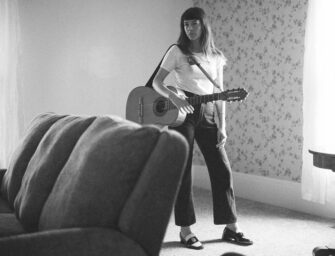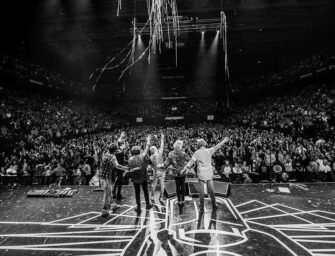
Ruston Kelly: “There has always been a struggle to find meaning and empowerment amid the tendency to destroy or self-destruct.”
The alt-country star on moving to Portland, Tennessee, clearing away life’s rubble and writing his bold new album The Weakness
Ruston Kelly’s new album The Weakness has a very real feeling of life and art combining in order to make a great record. Having moved out of Nashville, Kelly retreated to the solitude of an old bungalow in the small Tennessee town of Portland. Removed from his everyday life in order to process his recent divorce, the seeds of new songs eventually began to scatter.
Now brought to life with the help of producer/songwriter/multi-instrumentalist Nate Mercereau, the record is Kelly’s boldest-sounding yet. Fear not though, fans of Dying Star and Shape & Destroy will find that the raw and honest heart at the centre of his songwriting beats as proudly as ever. If anything, the textured production pumps new life into Kelly’s alt-country sound and marks the start of a brave new chapter – one we were keen to learn all about during our recent chat…
Click here for more interviews
Were you armed with any songs before you headed to Portland or did everything grow out of that period of solitude?
“All of the songs except for Hellfire were new. Hellfire I had been playing live with the band for a couple years, but I’d never been able to get the right studio recording of it. At first, when I moved to Portland I felt unable to write, given the amount of rubble clearing I knew I was gonna be working with. It was just too much, which has never been the case. I’ve always been able to write.
“But then slowly, as I turned my attention on real-time growth and working on remodelling my house, they started to just pop out one at a time: St Jupiter, bam, The Weakness, bam, Wicked Hands, bam. All at once too. Like verses and choruses just started flowing.”

Ruston Kelly: “ Too much edit can suck the spirit out. But just the right amount can truly make a song go from awesome to great.”
Did working on yourself and writing a new album always go hand in hand or would one sometimes interfere with the other?
“There has always been a struggle to find meaning and empowerment amid the tendency to destroy or self-destruct. All my music is an attempt to thwart that, to connect with the better part of experience and reality. It’s a call out to the Divine to say, ‘I’m here, I’m trying.’ It doesn’t always go hand in hand, but when it does it’s a really beautiful thing.
“I didn’t realise I was living out the purpose of this record while reconstructing, not just a home, but an identity during the pandemic and my divorce. And this time, expressing myself creatively certainly went hand in hand with that intention and experience.”
Does your process always start in the same way or does it differ from song to song?
“I think I have a process, but I really don’t. It’s a blessing and a curse to let the subconscious take the wheel and be able to get 70% of a song revealed to you instantly. It doesn’t always work that way, sometimes a song idea comes after sitting and doing nothing. Or trying too hard for hours. But most of the time I feel it coming and it’s like a pipe about to burst. And once I get at least a verse and a chorus, I approach the editing process by seeing what I was trying to reveal to myself from that stream of consciousness and write the rest from there.”
So you’ll edit and improve the lyrics until you’re happy?
“There is a vibe I try and go for… if that makes sense. That’s the bar. Can’t be corny or oversaid. Has to say what it is I mean, or at least a coloured variation through metaphor or whatever that elicits a strong emotion in me to qualify something as a “good” lyric.”
Are you ever worried that listeners will be picking through your lyrics looking to gain revelations into your personal life?
“No, I’m aware this is part of the territory. I did the same thing when I was listening to my favourite bands or artists. I still do. Pick away.”

Ruston Kelly: “Most of the time I feel it coming and it’s like a pipe about to burst.”
What did Nate Mercereau bring to the process and how did working with him differ from working with other producers?
“Nate absolutely challenged my perception of my own vision in such a refreshing and inspiring way. He brought a plethora of instrumental skill and otherworldly intent that took the record into the exact place I was wanting it to go. Reaching new and uncharted territory while also reemphasising but reimagining my sound as an artist.
“The difference between him and others is just that, different. And that’s what I wanted to do with this record; step into a brand new place that still felt familiar to me. I just needed that new energy to find it.”
Do you find it hard to take advice on your songs or is it a part of the process that serves them well?
“I initially do take advice on my songs with a grain of salt, I may be less likely to take outside input on something so personal. But Mark Williams my A&R, as well as Nate, were always challenging me to improve, and if there was a turnaround or a lyric that could be better, we saw that area of the project as a team effort. And ultimately, they’re input made them better. I mean Breakdown wouldn’t be the same song if I hadn’t of decided to finish writing it with Nate and hear a newness round out my original intention with it.”
The title track feels like a perfect introduction to everything that follows – what can you tell us about the writing process?
“That one came out the fastest. I was just sitting at my desk in my house and kind of turned off my writer’s brain. I picked up an electric baritone, which I hadn’t really done yet to write, and decided to tune it in my tuning I use a lot for acoustics (open). The words all came out at once because I think I had freed myself from ‘trying to write’ and just let myself have fun with music. Which makes sense that it opened the door for everything else to come from that vein.”

Ruston Kelly: “My biggest strength as a songwriter is my ability to convey a feeling that’s hard to put your finger on.”
Are there areas of your songwriting that you feel are weaker than others?
“I wouldn’t say weak, but I would say I procrastinate most on the editing/finalising process. Too much edit can suck the spirit out. But just the right amount can truly make a song go from awesome to great. It’s tedious and I have trouble with tediousness, but the end result is always worth it. I kind of have an internal clock ticking for each song as to sense when I get inspired to sit down and really edit. I kind of wait for that to start ticking.”
What do you think are your biggest strengths as a songwriter?
“My biggest strength as a songwriter is my ability to convey a feeling that’s hard to put your finger on, but makes you feel it very strongly and viscerally.”
How have you changed as a songwriter since writing Dying Star?
“I think I moved into a little more literal/narrative style on this record. To use less flowery words or metaphors and go straight to real-time descriptions of an event. Mending Song is the best example of this.”
What’s the key to writing songs that are candid and potentially painful?
“Living them.”
Lastly, what are you hoping the listener takes away from The Weakness?
“My hope is that they discover a hero in themselves, but like a real, everyday hero of their own life, one that doesn’t give up no matter the weight of experience and no matter how many times you have to get back up.”


































Related Articles